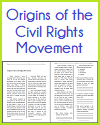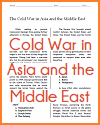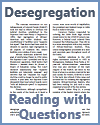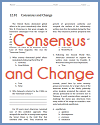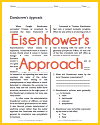The Cold War at Home |
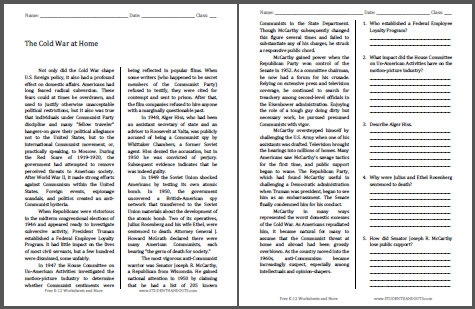 Not only did the Cold War shape U.S. foreign policy, it also had a profound effect on domestic affairs. Americans had long feared radical subversion. These fears could at times be
overdrawn, and used to justify otherwise unacceptable political
restrictions, but it also was true that individuals under
Communist Party discipline and many "fellow traveler" hangers-on
gave their political allegiance not to the United States, but to
the international Communist movement, or, practically speaking,
to Moscow. During the Red Scare of 1919-1920, the government had
attempted to remove perceived threats to American society. After
World War II, it made strong efforts against Communism within
the United States. Foreign events, espionage scandals, and
politics created an anti-Communist hysteria.
Not only did the Cold War shape U.S. foreign policy, it also had a profound effect on domestic affairs. Americans had long feared radical subversion. These fears could at times be
overdrawn, and used to justify otherwise unacceptable political
restrictions, but it also was true that individuals under
Communist Party discipline and many "fellow traveler" hangers-on
gave their political allegiance not to the United States, but to
the international Communist movement, or, practically speaking,
to Moscow. During the Red Scare of 1919-1920, the government had
attempted to remove perceived threats to American society. After
World War II, it made strong efforts against Communism within
the United States. Foreign events, espionage scandals, and
politics created an anti-Communist hysteria.When Republicans were victorious in the midterm congressional elections of 1946 and appeared ready to investigate subversive activity, President Truman established a Federal Employee Loyalty Program. It had little impact on the lives of most civil servants, but a few hundred were dismissed, some unfairly. In 1947 the House Committee on Un-American Activities investigated the motion-picture industry to determine whether Communist sentiments were being reflected in popular films. When some writers (who happened to be secret members of the Communist Party) refused to testify, they were cited for contempt and sent to prison. After that, the film companies refused to hire anyone with a marginally questionable past. In 1948, Alger Hiss, who had been an assistant secretary of state and an adviser to Roosevelt at Yalta, was publicly accused of being a Communist spy by Whittaker Chambers, a former Soviet agent. Hiss denied the accusation, but in 1950 he was convicted of perjury. Subsequent evidence indicates that he was indeed guilty. In 1949 the Soviet Union shocked Americans by testing its own atomic bomb. In 1950, the government uncovered a British-American spy network that transferred to the Soviet Union materials about the development of the atomic bomb. Two of its operatives, Julius Rosenberg and his wife Ethel, were sentenced to death. Attorney General J. Howard McGrath declared there were many American Communists, each bearing "the germ of death for society." The most vigorous anti-Communist warrior was Senator Joseph R. McCarthy, a Republican from Wisconsin. He gained national attention in 1950 by claiming that he had a list of 205 known Communists in the State Department. Though McCarthy subsequently changed this figure several times and failed to substantiate any of his charges, he struck a responsive public chord. McCarthy gained power when the Republican Party won control of the Senate in 1952. As a committee chairman, he now had a forum for his crusade. Relying on extensive press and television coverage, he continued to search for treachery among second-level officials in the Eisenhower administration. Enjoying the role of a tough guy doing dirty but necessary work, he pursued presumed Communists with vigor. McCarthy overstepped himself by challenging the U.S. Army when one of his assistants was drafted. Television brought the hearings into millions of homes. Many Americans saw McCarthy's savage tactics for the first time, and public support began to wane. The Republican Party, which had found McCarthy useful in challenging a Democratic administration when Truman was president, began to see him as an embarrassment. The Senate finally condemned him for his conduct. McCarthy in many ways represented the worst domestic excesses of the Cold War. As Americans repudiated him, it became natural for many to assume that the Communist threat at home and abroad had been grossly overblown. As the country moved into the 1960s, anti-Communism became increasingly suspect, especially among intellectuals and opinion-shapers. |
Click here to print. Answer Key: (1) Harry Truman; (2) Film companies refused to hire anyone with a marginally questionable past; (3) Former assistant secretary of state and Roosevelt adviser who was accused of being a Communist spy; (4) Convicted of participating in a spy network that helped the Soviet Union to develop an atomic bomb; (5) He challenged the U.S. Army; people were upset by seeing his savage tactics broadcast on television. |
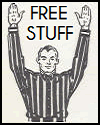 |
|---|
Text courtesy of the U.S. State Department, Bureau of International Information Programs, 2005 |


